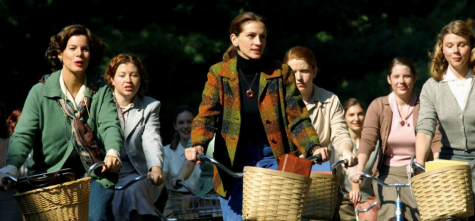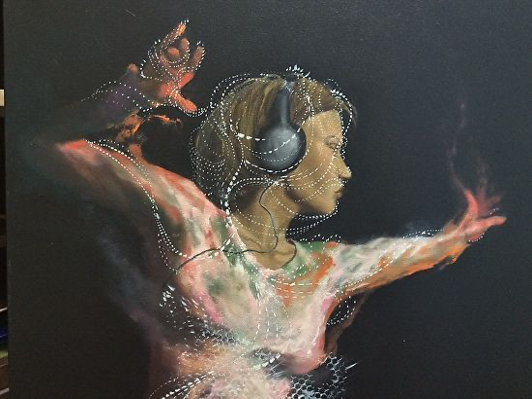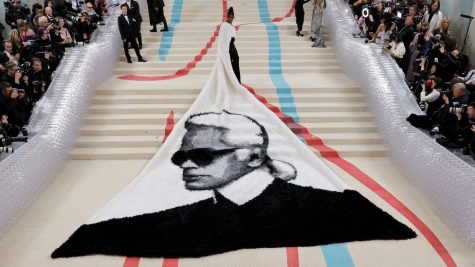Why the Movie ‘Mona Lisa Smile’ Made Me Smile

More often than not, the conflicts which arise between contemporary social values and those presented by historical period films fail to afford their characters much depth and ingenuity as individuals. However, the 2003 drama Mona Lisa Smile not only excels at providing each character with depth too genuine to sympathize with, but also contains an ending which leaves us wanting more.
The film is set in 1950s America, and focuses on Ms. Watson, a non-conformist and free-thinking teacher, as she enters a reserved all-women’s school in which she encourages the students to pursue their dreams and aim to become more than the housewives they were expected to be. The contrast between Ms. Watson’s ideology and that of the school is one that is compelling in its portrayal. The film offers more than just a criticism of the outdated secrecies and expectations of the 1950s by confronting these issues directly. This is especially evident when the most out-spoken student, Betty Warren, confronts Ms. Watson for promoting the importance of their education and further pursuits, stating: “Don’t disregard our traditions just because you’re subversive.” This statement further denotes the prevalence of the unspoken gender-roles they were expected to fulfill.
Betty Warren remains stubborn in her rejection of Ms. Watson’s ideology, which leads her to write an article in an attempt to have her removed from the school. Nonetheless, Betty Warren’s character should not be concealed, as her actions still provide her with an insightful portrayal that is vital to the story, like when she is upset that her husband leaves abruptly during her anticipated dinner party.
It may be argued that she is the character we are most encouraged to sympathize with due to her double-faced nature, as viewers are encouraged to pity her when the pressure from her mother and her husband – who is often unfaithful to her – are revealed.
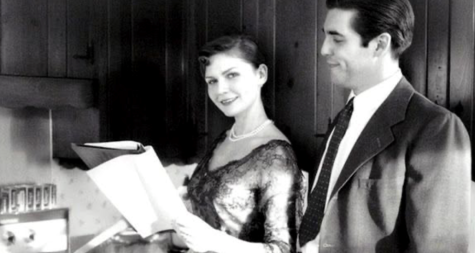
Throughout the film, Ms. Watson encourages the women to think, not only about their academic analysis of art history, but also their conformity to 1950s stereotypes. This is most evident when she states: “Stop talking, and look. You’re not required to write a paper. You’re not even required to like it. You are required to consider it.” The curious mindset of Ms. Watson reveals the hidden pursuits of every character in the film, as she treats them as something more than what 1950s society argued they were.
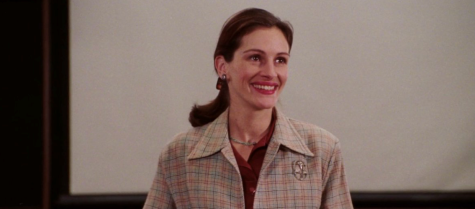
However, Ms. Watson’s outlook on life is soon confronted by Betty Warren’s distasteful article about her rebellion to ‘tradition’. Ms. Watson states that she “…didn’t realize that by demanding excellence [she] would be challenging…the roles [the girls] were ‘born to fill’,” whilst showing a series of stereotypical images of women throughout history in order to challenge this perspective.
In the film, we also navigate the close connection between Ms. Watson and a more impressionable student, Joan Brandwyn, in her contemplation of pursuing law school, which directly challenges her friend, Betty Warren’s, planned path of getting married in the 1950s. Despite receiving a bad grade in Ms. Watson’s class, Joan understands the moral compass that Ms. Watson urges her to comprehend, when Ms. Watson says, “If I wanted to know what [Strauss] thought, I’d buy his book.”. The composition within the camera frame immediately conveys the message in all of Ms. Watson’s lessons, which is extremely significant in analyzing not only art history, but rather history itself.
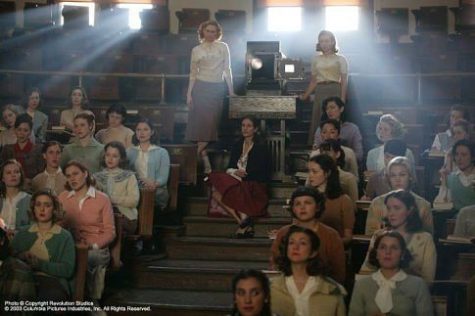
To conclude, the movie Mona Lisa Smile portrays the impact of women’s roles in the 1950s: a decade during which their careers were forecasted and their actions were criticized. The resolution at the end of the movie offers a change in perspective for the students, with some still conforming to societal expectations whilst living independently with the knowledge that they have many options.
